1. Rockford, Illinois

Rockford’s housing market is on the rise, with home prices appreciating by approximately 9% over the past year. This surge is attributed to increased demand and limited housing inventory, making it one of the hottest real estate markets in the Midwest. However, the city’s economic landscape tells a different story. Despite the uptick in home values, Rockford continues to grapple with a lack of job diversification and high unemployment rates, hindering overall economic growth.
The city’s manufacturing sector, historically a cornerstone of its economy, has faced challenges in adapting to modern demands. While companies like Collins Aerospace and Woodward have established significant operations in the area, the job market remains concentrated in a few industries. This lack of diversification leaves the local economy vulnerable to sector-specific downturns. Consequently, while home prices rise, the job market struggles to keep pace, creating a disparity between housing demand and employment opportunities.
2. Syracuse, New York
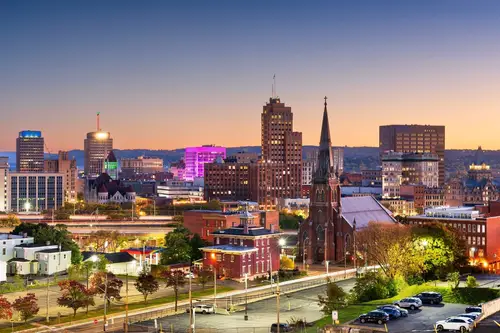
Syracuse has experienced a notable increase in home prices, with values rising by over 9% in the past year. This growth is driven by a combination of factors, including low housing inventory and increased interest from buyers seeking affordable options. Despite this, the city’s job market has not seen similar growth. Employment opportunities remain limited, with many residents commuting to nearby cities for work, indicating a disconnect between housing demand and local job availability.
The city’s economy has been slow to recover from past industrial declines, and efforts to diversify have yielded limited results. While sectors like education and healthcare provide some employment, they are not sufficient to drive widespread economic growth. The lack of a robust job market poses challenges for residents seeking stable employment opportunities. As home prices continue to climb, the stagnant job market raises concerns about long-term economic sustainability.
3. New Haven, Connecticut
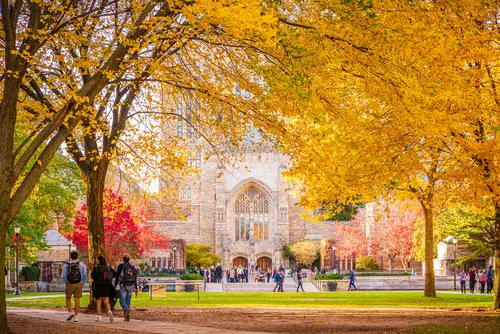
New Haven’s housing market is experiencing a resurgence, with home prices increasing by approximately 9.6% over the past year. This growth is fueled by a combination of factors, including a strong local university presence and an influx of buyers attracted to the city’s cultural amenities. However, the job market has not kept pace with the housing boom. Employment opportunities remain concentrated in a few sectors, and overall job growth has been sluggish, leading to concerns about economic balance.
The city’s reliance on education and healthcare as primary employment sectors limits job diversification. While these industries provide stability, they do not offer the breadth of opportunities needed to support a growing population. The lack of job diversification can lead to economic vulnerabilities, especially if these sectors face downturns. As housing prices rise without corresponding job growth, the city may face challenges in maintaining economic equilibrium.
4. Buffalo, New York

Buffalo’s housing market is witnessing a significant uptick, with home prices appreciating steadily over the past year. This growth is attributed to revitalization efforts in certain neighborhoods and an influx of buyers seeking affordable housing options. However, the city’s job market has not experienced similar growth. The local economy continues to struggle with high poverty rates and a lack of high-paying job opportunities, creating a disconnect between housing demand and employment prospects.
The decline of manufacturing and other traditional industries has left a void in the job market. While there have been efforts to attract new businesses, these initiatives have yet to yield substantial results. The high poverty rate and low median household income indicate ongoing economic challenges. As home prices rise, the stagnant job market raises concerns about the city’s ability to sustain long-term economic growth.
5. Spokane, Washington
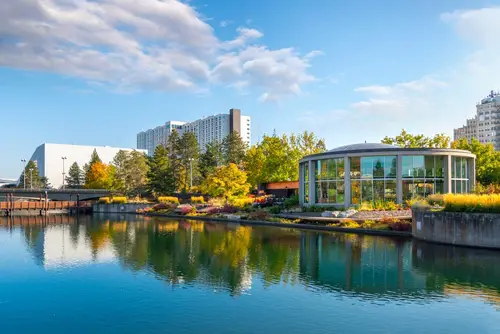
Spokane’s housing market is on the upswing, with home prices increasing due to a combination of factors, including low inventory and increased demand. The city’s appeal to remote workers and retirees has further fueled this growth. However, Spokane’s job market has not kept pace with the housing boom. Employment opportunities remain limited, with many residents facing challenges in finding well-paying jobs locally.
The city’s economy has struggled to diversify, relying heavily on a few industries such as healthcare and education. While these sectors provide some employment, they do not offer the breadth of opportunities needed to support a growing population. The lack of job diversification leaves the local economy vulnerable to sector-specific downturns. As housing prices rise without corresponding job growth, Spokane faces challenges in achieving balanced economic development.
6. Toledo, Ohio

Toledo’s housing market is experiencing a resurgence, with home prices increasing by over 10% in the past year. This growth is driven by factors such as low interest rates and a renewed interest in urban living. However, the city’s job market has not seen similar growth. Employment opportunities remain limited, with many residents commuting to nearby cities for work, indicating a disconnect between housing demand and local job availability.
The city’s economy has faced challenges due to the decline of traditional manufacturing industries. While efforts have been made to attract new businesses, these initiatives have yet to yield substantial results. The lack of a robust job market poses challenges for residents seeking stable employment opportunities. As home prices continue to climb, the stagnant job market raises concerns about long-term economic sustainability.
7. Jackson, Mississippi

Jackson’s housing market is on the rise, with home prices appreciating by approximately 10.5% over the past year. This increase is attributed to factors such as low housing inventory and increased demand from buyers seeking affordable options. However, the city’s job market has not kept pace with the housing boom. Employment opportunities remain limited, with many residents facing challenges in finding well-paying jobs locally.
The city’s economy has struggled with high poverty rates and a lack of job diversification. While sectors like government and education provide some employment, they do not offer the breadth of opportunities needed to support a growing population. The lack of a diversified economy leaves Jackson vulnerable to economic downturns. As home prices rise without corresponding job growth, the city faces challenges in maintaining economic balance.
8. Grand Junction, Colorado
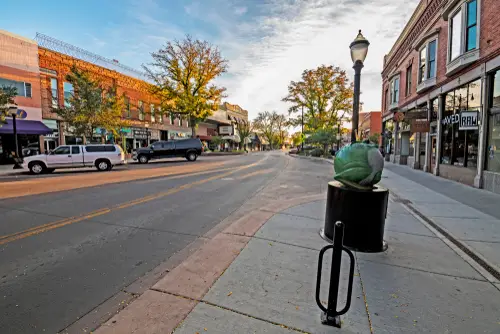
Grand Junction’s housing market is experiencing growth, with home prices increasing due to factors such as limited inventory and increased interest from remote workers and retirees. The city’s appeal lies in its affordability compared to other parts of Colorado and its outdoor recreational opportunities. However, the job market has not seen similar growth. Employment opportunities remain limited, with many residents commuting to nearby cities for work, indicating a disconnect between housing demand and local job availability.
The city’s economy has faced challenges due to its reliance on a few industries, such as agriculture and energy. While these sectors provide some employment, they do not offer the breadth of opportunities needed to support a growing population. The lack of job diversification leaves Grand Junction vulnerable to sector-specific downturns. As home prices rise without corresponding job growth, the city faces challenges in achieving balanced economic development.
9. Decatur, Illinois
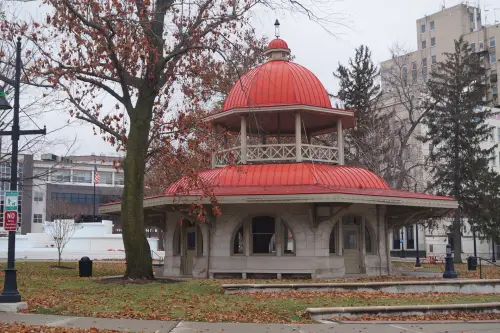
Decatur’s housing market is on the rise, with home prices appreciating by approximately 12.4% over the past year. This growth is attributed to factors such as low interest rates and a renewed interest in suburban living. However, the city’s job market has not kept pace with the housing boom. Employment opportunities remain limited, with many residents facing challenges in finding well-paying jobs locally.
The city’s economy has struggled with high unemployment rates and a lack of job diversification. While sectors like agriculture and manufacturing provide some employment, they do not offer the breadth of opportunities needed to support a growing population. The lack of a diversified economy leaves Decatur vulnerable to economic downturns. As home prices rise without corresponding job growth, the city faces challenges in maintaining economic balance.
10. Muncie, Indiana

Muncie’s housing market is experiencing growth, with home prices increasing due to factors such as low inventory and increased demand from buyers seeking affordable options. The city’s appeal lies in its affordability compared to other parts of Indiana and its proximity to larger metropolitan areas. However, the job market has not seen similar growth. Employment opportunities remain limited, with many residents commuting to nearby cities for work, indicating a disconnect between housing demand and local job availability.
The city’s economy has faced challenges due to its reliance on a few industries, such as education and manufacturing. While these sectors provide some employment, they do not offer the breadth of opportunities needed to support a growing population. The lack of job diversification leaves Muncie vulnerable to sector-specific downturns. As home prices rise without corresponding job growth, the city faces challenges in achieving balanced economic development.
11. Terre Haute, Indiana

Terre Haute’s housing market is on the rise, with home prices appreciating due to factors such as low interest rates and increased demand from buyers seeking affordable options. The city’s appeal lies in its affordability compared to other parts of Indiana and its proximity to larger metropolitan areas. However, the job market has not kept pace with the housing boom. Employment opportunities remain limited, with many residents facing challenges in finding well-paying jobs locally.
The city’s economy has struggled with high unemployment rates and a lack of job diversification. While sectors like education and healthcare provide some employment, they do not offer the breadth of opportunities needed to support a growing population. The lack of a diversified economy leaves Terre Haute vulnerable to economic downturns. As home prices rise without corresponding job growth, the city faces challenges in maintaining economic balance.
12. Beckley, West Virginia

Beckley’s housing market is experiencing growth, with home prices increasing due to factors such as limited inventory and increased interest from buyers seeking affordable options. The city’s appeal lies in its affordability compared to other parts of West Virginia and its outdoor recreational opportunities. However, the job market has not seen similar growth. Employment opportunities remain limited, with many residents facing challenges in finding well-paying jobs locally.
The city’s economy has faced challenges due to its reliance on a few industries, such as coal mining and tourism. While these sectors provide some employment, they do not offer the breadth of opportunities needed to support a growing population. The lack of job diversification leaves Beckley vulnerable to sector-specific downturns. As home prices rise without corresponding job growth, the city faces challenges in achieving balanced economic development.
13. Oxford, Mississippi

Oxford’s housing market is on the rise, with home prices appreciating due to factors such as low interest rates and increased demand from buyers seeking affordable options. The city’s appeal lies in its proximity to the University of Mississippi and its vibrant cultural scene. However, the job market has not kept pace with the housing boom. Employment opportunities remain limited, with many residents facing challenges in finding well-paying jobs locally.
The city’s economy has struggled with high poverty rates and a lack of job diversification. While sectors like education and healthcare provide some employment, they do not offer the breadth of opportunities needed to support a growing population. The lack of a diversified economy leaves Oxford vulnerable to economic downturns. As home prices rise without corresponding job growth, the city faces challenges in maintaining economic balance.
14. Blytheville, Arkansas

Blytheville’s housing market is experiencing a notable surge, with median listing prices increasing by 8.6% year-over-year as of July 2025. This uptick is largely driven by the area’s affordability and the influx of buyers attracted to its low cost of living. However, the job market has not kept pace with the rising housing demand. Despite the presence of major steel manufacturers like U.S. Steel and Nucor, the local economy faces challenges in attracting and retaining a skilled workforce.
The “Work Here, Live Here” initiative, launched in 2022, aims to address this issue by offering financial incentives for homebuyers who also work locally. While the program has led to the construction of approximately 250 new homes and the renovation of 52 existing ones, it has not fully bridged the gap between housing demand and job availability. Many workers still commute from neighboring states or reside in temporary housing due to a lack of local amenities and affordable homes. This situation underscores the broader challenge of balancing industrial growth with community development in Blytheville.
15. Bismarck, North Dakota

Bismarck’s housing market is experiencing a significant boom, with home prices increasing by 25.8% year-over-year as of July 2025. This surge is attributed to factors such as low interest rates and an influx of buyers seeking affordable housing options. However, the city’s job market has not seen similar growth. Employment opportunities remain limited, with many residents facing challenges in finding well-paying jobs locally.
The city’s economy has struggled with high unemployment rates and a lack of job diversification. While sectors like education and healthcare provide some employment, they do not offer the breadth of opportunities needed to support a growing population. The lack of a diversified economy leaves Bismarck vulnerable to economic downturns. As home prices rise without corresponding job growth, the city faces challenges in maintaining economic balance.
This post 15 Cities Where Home Prices Are Rising but Jobs Aren’t was first published on Greenhouse Black.
